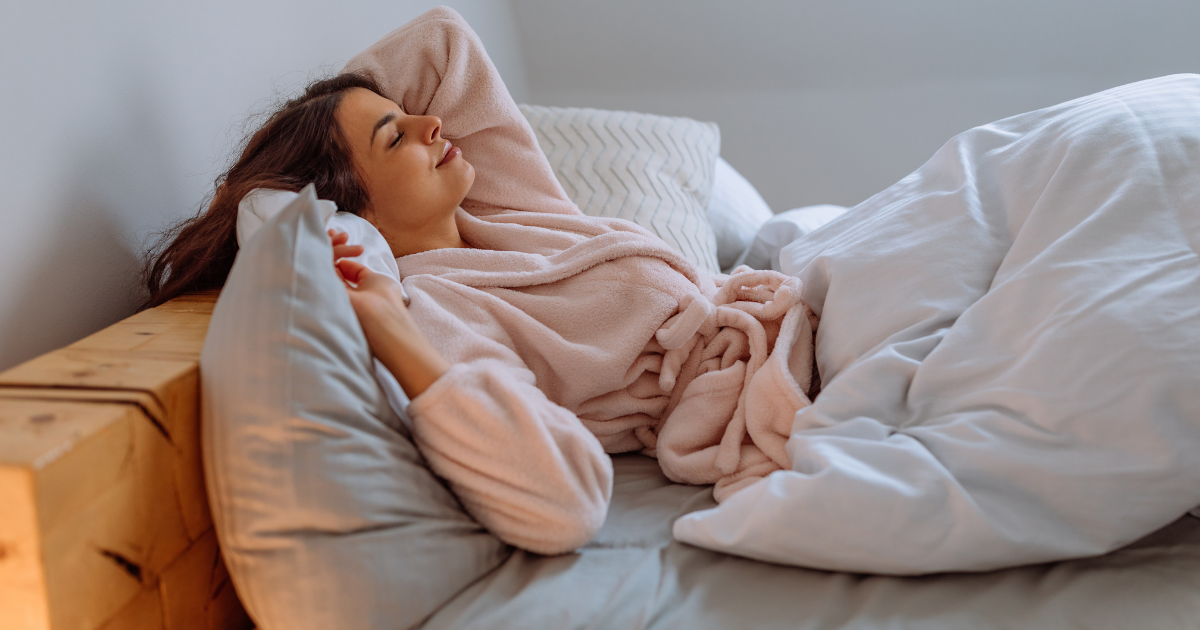How to Get Better Sleep

Many people struggle with insomnia, whether acute or chronic. This can lead to a myriad of co-morbidities, including stroke and heart disease. It’s critical to prioritize sleep, and here are a few tips to get started. First, power down. Remove all electronics from your bedroom (including your cell phone). Studies have shown that blue light is “read” by your brain even when you’re asleep. Make your bedroom a place strictly for sleeping, which means no electronics, a cool and comfortable temperature, and low or (better yet) no lighting. The exact ideal temperature for you might vary a bit, but for most people it’s about 66 degrees. If possible, invest in blackout curtains.
If you’re having trouble going to sleep or staying asleep and you’re a napper, get rid of them. Naps can be an effective sleep strategy for some people, but usually not for those who have insomnia. If you find yourself being sleepy during the afternoon, a short walk or other stimulating activity can help. If you absolutely have to nap, keep it to 20 minutes or less. Anything more will misalign your biological clock.
Sleep (that) Matters
Investing in a battery-operated alarm clock is a great way to get that phone out of your bedroom. However, make sure that it also doesn’t emit light. Not only will that light bother your sleep, but some people wake up and glance at their clock throughout the night. This can lead to stress and worry that ultimately keep you awake. If you can see your alarm clock at night, turn it away from you or move it somewhere you can’t see (like under the bed).
The right bedding also plays a big role in how you sleep. Those with back pain might benefit from a leg pillow. Update your head pillows routinely, as well as your mattress. A neck pillow should be supporting the neck’s natural curve. Side sleepers should have a pillow that aligns your nose with the middle of the body.
Also: Why Sleep is Important for Your Health
Avoid stomach sleeping entirely. If you’re a back sleeper, putting a pillow under your knees can increase comfort, too. Mattresses can quickly “fill up” with mold, allergy triggers, and dust mite droppings. Sealing them (and your pillows) is a great way to avoid these annoyances.
“Clocking” Great Sleep
In addition to making changes to your alarm clock, you should adjust your body clock, too. This will require going to bed and waking up at the same time, even on weekends. Don’t allow more than one hour of wiggle room. If you struggle to fully wake up in the mornings, enjoy some bright light within 5 – 30 minutes of waking. This may require a sunlamp. Doing this can trigger your body into knowing that it’s time to start the day and can be a lifesaver in darker months.
You already know that morning coffee is full of caffeine, which gets your body and brain buzzing. However, starting at noon, it’s important to avoid caffeine—and look for hidden caffeine in foods and drinks, too. For example, chocolates often have natural caffeine, as do some pain relievers (like some used for migraines).
Some people reach for caffeine to help with their workouts (which is effective), but if that’s you then you need to consider working out in the mornings. Overall, avoid working out right before bedtime if you can. Physical activity gives you a burst of energy that can keep you stimulated. Aim to finish your workout 3 – 4 hours before bed. Instead, mind-body exercises like gentle yoga and tai chi are great pre-bed activities.
Food and Drink Solutions
In many households, dinner is the big meal, but this isn’t always the best idea. It can overload the digestive system, which plays a role in sleep. Instead, make lunch the big meal and enjoy an evening snack or light meal (such as a bowl of cereal). No matter what you eat, finish it at least one hour before bed to allow for digestion. It’s also time to nix the nightcap. Alcohol can make you immediately sleepy, but after it wears off (while you’re asleep), it can actually wake you up. Instead, opt for a soothing drink like chamomile tea and Sip2Sleep®, which may help you fall asleep.
Also: 5 Natural Ways to Enhance Your Sleep Quality
Sip2Sleep® is made of just two organic ingredients: tart cherry juice and Venetron®. Both come from plants and may encourage sleep with its anti-inflammatory and stress-busting capabilities. However, it’s a good idea to avoid drinking anything right before bed because that can increase nighttime bathroom trips. If you do tend to wake up for the bathroom, keep the door closed with a dim nightlight inside so that you don’t shock your body awake. The good news is that Sip2Sleep® is a small-enough drinkable supplement that it shouldn’t interfere with your elimination tendencies.







